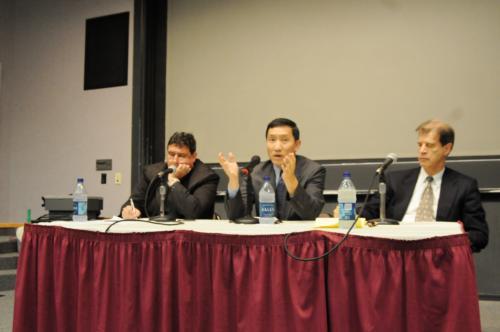
News
Summers Will Not Finish Semester of Teaching as Harvard Investigates Epstein Ties

News
Harvard College Students Report Favoring Divestment from Israel in HUA Survey

News
‘He Should Resign’: Harvard Undergrads Take Hard Line Against Summers Over Epstein Scandal

News
Harvard To Launch New Investigation Into Epstein’s Ties to Summers, Other University Affiliates

News
Harvard Students To Vote on Divestment From Israel in Inaugural HUA Election Survey
HKS Celebrates China’s National Day

The Harvard Kennedy School hosted a commemoration for the 59th anniversary of the People’s Republic of China, entitled “Celebrating China’s National Day—30 Years of Reform.” Nearly 100 people marked the three-decade anniversary of the occasion when China’s leaders gave nod to economic reform, gearing the country toward hefty growth.
The event featured a panel of three China experts: Kennedy School professor Anthony J. Saich, MIT professor Yasheng Huang ’85, and William H. Overholt ’68, the former director of the RAND Center for Asia Pacific Policy.
Saich opened the discussion by identifying the economic, social, and psychological shifts that are taking place in Chinese society. These transitions, he said, highlighted the achievements of China’s reform but posed challenges as well.
Saich focused on the problems within the psychological transition, calling China’s reform “a shift from the collective as the organizing focus to one which is more based on individual choice.”
Saich, who trains Chinese officials at the Kennedy School, pointed out that this trend persists despite the official ideology of socialism within the government.
“That presents a challenge for China’s future leaders as they think about what is the moral fabric of China,” he added.
Following Saich, Huang offered critical views of China’s recent development in urban areas.
“There are really two Chinas,” he said, “One is a more entrepreneur China, and the other is a more state-controlled China.”
Huang said that the former happened to be rural China and the latter, urban China.
“China’s current urbanization happened at a cost of the more entrepreneur China,” he said.
Drawing on more than 18 years of experience in Asia and at research institutes in the United States, Overholt said he wanted to “debunk some myths that are popular in this country” about America’s relation to China.
Rather than treating China as a threat, Overholt said that the United States should strengthen its ties with China and release its Cold War attitudes.
The audience praised the panel discussion as a good way to celebrate the holiday.
“When I first went to China in 1985 they were celebrating this holiday,” said Anne L. Fessenden, an affiliate at the Fairbank Center for Chinese Studies. Fessenden taught English in China for four years in the 1980s.
“I think it’s interesting to see how they celebrate it here,” she added.
Want to keep up with breaking news? Subscribe to our email newsletter.
